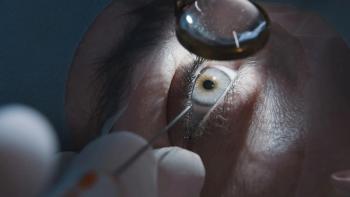
Eye doctor plays tournament croquet on national level
FYI
James C. Huff, OD
Phone: 770/832-6272
E-mail: dochuffod@bellsouth.net
‘There’s no real prize money playing croquet. It’s more for fun and bragging rights.’
James C. Huff, OD
‘I need to find a way to retire so I can play more and get better.’
James C. Huff, OD
Optometrist converts backyard into a world-class croquet court
By Carol Patton
James C. Huff, OD, and his wife live in a beautiful home in Carrollton, GA, surrounded by a lake on three sides. That’s why Mrs. Huff wasn’t exactly thrilled when her husband spent roughly $70,000 to create a championship-sized croquet court in their yard. The project meant cutting down nearly 50 mature trees, some 100-feet tall, to create a perfectly flat 9,000 square-foot area plus a sea wall to avoid erosion of the land.
Some people may call Dr. Huff crazy. He is crazy-crazy in love with croquet and maintaining a world-class lawn. The attraction started rather innocently back in the late 1990s when the Huffs were shopping for a fun game they could play with their friends at an upcoming party. By the time the event ended, Dr. Huff and several guests were hooked.
Since then, he and his friends have played croquet twice a week and compete in state and national tournaments. Dr. Huff has won numerous awards and hosts unofficial tournaments in his yard, enabling him to compete with the game’s most skilled players.
The right stuff
Dr. Huff said the game is like playing chess, billiards, and golf all at the same time. According to the U.S. rules for domestic croquet (www.croquetamerica.com), otherwise known as six-wicket games, the object of the game is to get your team’s two balls through all of the hoops-also called wickets-in the proper order and hit the center peg before your opponent.
Unknown to Dr. Huff, the croquet set he originally purchased was designed for children. The mallets were shorter and the balls smaller. But not having played the game since grade school, no one realized it until he and several friends attended a state tournament.
“It was too late to enter so four of us went to watch the final game,” said Dr. Huff, a third generation family optometrist. “They were using taller mallets, bigger balls, and tighter wickets. The wickets we were using had about one and one-half inch clearance for balls. They were using wickets with clearances of one-sixteenth of an inch, about the thickness of a dime.”
Because Dr. Huff and his friends planned on playing tournament croquet, they had to upgrade their equipment. They split the cost of a set of balls at $200, a set of wickets at $300, and mallets, which he compares to golf drivers, at nearly $300 each. While the game can be played on any lawn, a friend spent $3,000 to build a mini croquet court on part of his lawn, which required the yard to be bulldozed and leveled.
“The court was two-thirds the size of a full-size court,” he said. “Once we got the better equipment, we realized how hard the game was. So we played out there for 5 years or so and worked on our game.”
On the tournament circuit
As Dr. Huff’s croquet skills grew, so did his successes playing in national tournaments and the Georgia State Croquet Championship. He explained that there are three tournament levels or divisions: second flight, which is the easiest; first flight, which targets more experienced players, and championship flight, which attracts the game’s top competitors. Once a player wins first place in a flight, he can no longer compete in that division. The player must advance to the next level.
In 1999, Dr. Huff won first place in the second flight. Two years later, he competed in croquet Nationals at West Palm Beach, FL.
“I wanted to see how I ranked nationally,” he said. “I came in second place in first flight in doubles. The next year I won second place in first flight in singles.”
His passion for the game inspired him to build his very own croquet court, which is now on the Georgia state tournament circuit. Dr. Huff said that every other year, croquet players compete in his own backyard-literally. Other times, he hosts pickup tournaments for beginners and unofficial games for former champions, giving him the opportunity to play against the sport’s top competitors.
On a national level, Dr. Huff said his best tournament was played on his own lawn. He came in second when competing against seven previous and future national champions.
Dr. Huff has no plans to quit playing the game anytime soon. He said most players are retired and fall between the ages of 60 and 80.
“I need to find a way to retire so I can play more and get better,” he said. “There’s no real prize money playing croquet. It’s more for fun and bragging rights.”ODT
Newsletter
Want more insights like this? Subscribe to Optometry Times and get clinical pearls and practice tips delivered straight to your inbox.





